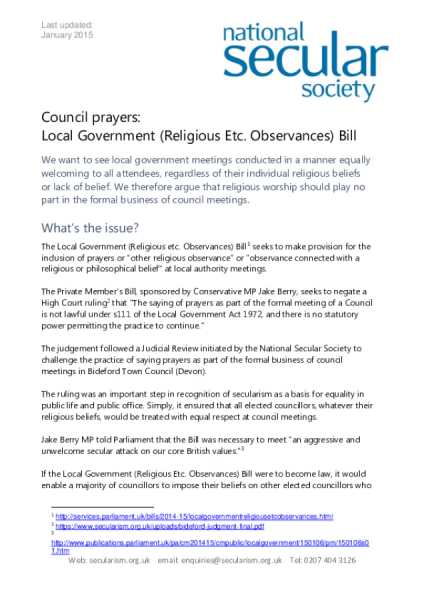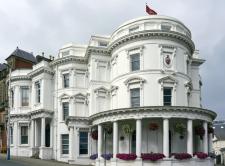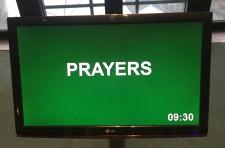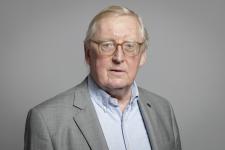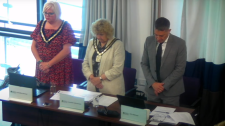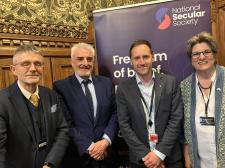Council Prayers
We think local government meetings should be conducted in a manner equally welcoming to all attendees, regardless of their individual religious beliefs or lack of belief. We therefore argue that religious worship should play no part in the formal business of council meetings.
Local Government (Religious Etc. Observances) Act
The Local Government (Religious etc. Observances) Act made provision for the inclusion of prayers or "other religious observance" or "observance connected with a religious or philosophical belief" at local authority meetings.
The law was written to negate a High Court ruling that "The saying of prayers as part of the formal meeting of a Council is not lawful under s111 of the Local Government Act 1972, and there is no statutory power permitting the practice to continue."
That judgement followed a Judicial Review initiated by the National Secular Society to challenge the practice of saying prayers as part of the formal business of council meetings in Bideford Town Council (Devon).
The ruling was an important step in recognition of secularism as a basis for equality in public life and public office. Simply, it ensured that all elected councillors, whatever their religious beliefs, would be treated with equal respect at council meetings.
The Local Government (Religious etc. Observances) Act was sponsored by Conservative MP Jake Berry, a supporter of the Conservative Christian Fellowship, but was prepared by the Department for Communities and Local Government, led then by the evangelical Eric Pickles who insists Britain is a "Christian country".
The Act's supporters claim that the Bill promotes religious freedom. We believe the opposite to be true.
Allowing acts of worship to be imposed in a secular environment, as the Act does, is incompatible with a genuine commitment to religious freedom. The Act enables a majority of councillors to impose their beliefs and acts of worship on other councillors, and can, in effect, impose religion by 'tyranny of the majority'.
Religious freedom protects both freedom of religion and belief. It protects an individual's rights to manifest their religion, but should not extend to allowing believers to impose acts of worship on those that do not share their faith.
The absence of prayers from the formal business of local authority meetings doesn't impede the religious freedoms of believers or deny anybody the right to pray. The former legal position simply prevented local authorities from summoning councillors to religious observance at council meetings and imposing it on those that do not wish it.
Local politics should be equally welcoming to all sections of society. Local government meetings should be conducted without anyone feeling compelled to participate in prayers, or feeling excluded, or that they have to absent themselves from any part of the meeting.
We fear this legislation opens the door to wholly unnecessary conflict and sectarian squabbles within local authorities.
This legislation was not properly debated, nor did it receive serious scrutiny or consideration in parliament, with MPs on the Public Bill Committee failing in their duty to properly consider the implications of this wholly unnecessary and divisive legislation.
If local authorities wish to hold a moment of silent reflection at the beginning of a meeting, or if councillors wish to meet for prayers prior to the meeting, they should be at liberty to do so but no change in the law was necessary to facilitate this.
Find out more
Related News
Majority of public support removing Isle of Man bishop’s vote
Posted: Fri, 15 Mar 2024 19:37
Most Manx residents back removing prayers and votes for clerics from parliament.
End prayers in House of Commons, NSS urges Speaker
Posted: Tue, 6 Feb 2024 13:57
Speaker should use his position to end symbolic Church of England privilege in Parliament, NSS says.
Peer calls for more secular democracy in RE debate
Posted: Fri, 19 Jan 2024 15:37
Lord Warner challenges prayers in parliament and schools, bishops' bench, and faith schools.
NSS welcomes council decision to replace prayers at meetings
Posted: Fri, 28 Jul 2023 13:17
The National Secular Society has welcomed a council's decision to replace prayers at meetings with a 'moment of contemplation'.
Chair of Newark and Sherwood District Council Cllr Celia Brooks told a full council meeting on July 18th (pictured) that the council is a "new, progressive model" and councillors "will now be asked to spend a moment before the full council meetings in contemplation of the business of the meeting, or other matters from the wider community which may impact on our residents".
She added: "It is felt that this being a replacement for pre-meeting prayers demonstrates the way in which the council wishes to work to be inclusive of, and truly representative of, all our communities".
She then asked for councillors to stand and offer silent "thoughts or prayers" for those affected by the recent murders in Nottingham.
Conservative councillor Rhonda Holloway, who opposed the change, said she read the "usual prayer" before heading to the civic suite for the full council meeting.
The decision to replace the prayers comes after the Conservative Party lost their majority after the May local elections.
Several local authorities in England begin their meetings with prayer as part of their official business, although others recognise that the practice is inappropriate. Last year, Isle of Wight Council and Congleton Town Council decided to end prayers opening meetings.
The NSS campaigns for inclusive local democracy and opposes the imposition of acts of worship in council meetings.
Welcoming Newark and Sherwood District Council's decision, NSS head of campaigns Megan Manson said: "This is an excellent move by the council, which will make meetings far more inclusive of residents of all faiths and beliefs.
"Everyone can participate equally in a moment of reflection – and, as we're already seeing, councillors who do wish to pray can still do so before they enter the meeting.
"We encourage all other local councils to follow Newark and Sherwood District Council's progressive example."
Tackling CofE privilege unites Anglicans and atheists at NSS event
Posted: Thu, 18 May 2023 11:46
Politicians and priests united to challenge Church of England privileges at a National Secular Society event in parliament yesterday.
Four speakers joined the NSS's discussion on the future of church and state to argue why separation between the two would benefit both the UK state and the Church itself.
The event at the Houses of Parliament was held in the wake of King Charles' Anglican coronation this month, which shone a spotlight on the intimate relationship between church and state in the UK.
The Church's established status has also come under increased scrutiny over its continued discrimination against LGBT people and women, and its recent safeguarding scandals.
The four speakers called for an end to the CofE's many privileges, including automatic seats for its bishops in the House of Lords and Christian prayers imposed in parliament and schools.
Tommy Sheppard MP: Church in parliament "offends against a sense of democracy"
The event was opened by Scottish National Party MP Tommy Sheppard, who sponsored the event. He said he was "surprised and shocked" by the extent to which the Church permeates parliament, and that both prayers in parliament and bishops in the Lords "offend against a sense of democracy".
Pointing to the recent Census results for England and Wales, which revealed Christians are a minority for the first time, he said we are "no longer a Christian country" and that the role of the Church in parliament is "incredibly unrepresentative" of the population. He said it was incumbent on the government to make parliament more representative. He plans to arrange a debate on the bishops' bench and put questions to ministers that "they will find hard to answer".
Jayne Ozanne: The established Church 'doesn't serve anyone particularly well'
Jayne Ozanne, a prominent gay evangelical who works to ensure full inclusion of LGBT+ people within faith communities, highlighted that only 55% of British people trust clergy to tell the truth. This is less trustworthy than taxi drivers, and is 30 points behind trust levels in 1983.
She said this decline in trust in the Church "should cause greatest concern", but comes as "no surprise" in the wake of sexual abuse scandals and cover-ups, including the recent report into bishops' inaction over rapist priest Trevor Devamanikkam. She also condemned the "toxic nature of institutional homophobia" in Church culture. She said the "tide is turning" on the "hypocrisy" of the Church "lecturing" the government on morality.
Ozanne said that bishops should not be automatically elevated to the House of Lords, and criticised them for using their privilege to obtain exemptions from equality law to discriminate against LGBT people.
Finally, she questioned who establishment serves. She said doesn't serve the monarch, the country, God or even the bishops, because serving in the House of Lords interferes with their role of running a dioceses. She concluded that establishment doesn't serve "anyone particularly well", ending with: "We need champions who will defend all the vulnerable, who will speak and be heard, and whose voices are ones that the nation recognise as trustworthy and true.
"And I'm sorry to say that this is no longer, in my mind, automatically that of the bishops – and so their privileges must now go".
Dr Martyn Percy: Established Church is an overcrammed "vestry cupboard"
Ozanne was followed by theologian and ordained CofE priest Dr Martyn Percy. He compared establishment with an old, dusty "vestry cupboard" overcrammed with things no longer needed. He said that he was "really struck" by the Church's efforts to make things "look clean and tidy", when underneath is "chaos, confusion and even corruption". He said he is still a Christian but has "lost faith" in the Church of England to reform itself.
Dr Percy criticised Church law as "out of touch" with employment and human rights law, and Church safeguarding as a "catastrophic mess", with too many conflicts of interest and conflation of power and authority.
He echoed Ozanne's concerns about the Church's failure to solve issues like same-sex marriage, and said the bishops in the Lords are "highly problematic" as they should be there on merit rather than appointed by right.
He said "parliament must act" to repeal the Church's privileges and that it would not take much time to set things in motion.
Finally, quoting Michael Caine in The Italian Job, he said the solution to the 'vestry cupboard' of the established church is to "blow the bloody doors off".
Polly Toynbee: Coronation a "turning point" for the established Church
The final speaker, writer and broadcaster Polly Toynbee, said the coronation was a 'shocking wake up moment' for many people, who were left "gobsmacked" by the highly religious and "peculiar" nature of the ceremony and the vows King Charles took to maintain "the Laws of God" and the "Protestant Reformed Religion established by law". She pointed out this meant the archbishop "had more powers than the King did", and that the coronation was therefore "quite a turning point" in making disestablishment relevant.
Toynbee highlighted how the Church's privileges support state-funded Church of England faith schools, many of which are "socially selective" due to their religiously discriminatory admissions policies, and the law requiring collective worship in all schools.
She criticised the bishops using their privileges in parliament to oppose a range of social reforms, including same sex marriage and assisted dying. She stressed that we have to remember the Church still has an "enormous impact on how we live and how we die".
NSS chief executive" "Really heartening to see a growing 'broad church' in favour of replacing privilege with equality"
NSS chief executive Stephen Evans, who chaired the event, said: "This discussion not only emphasised why it is more important than ever to disestablish the Church of England – it demonstrated that the appetite for separation of church and state is growing among Brits of all religions and beliefs.
"It is really heartening to see a growing 'broad church' in favour of replacing privilege with equality. And our excellent speakers last night embodied this perfectly.
"A huge thank you to Tommy Sheppard, Jayne Ozanne, Martyn Percy and Polly Toynbee for so eloquently putting into words what increasing numbers of individuals, both within and outside of the Church, are thinking."
Image: (From left): Martyn Percy, Tommy Sheppard, Stephen Evans and Jayne Ozanne


